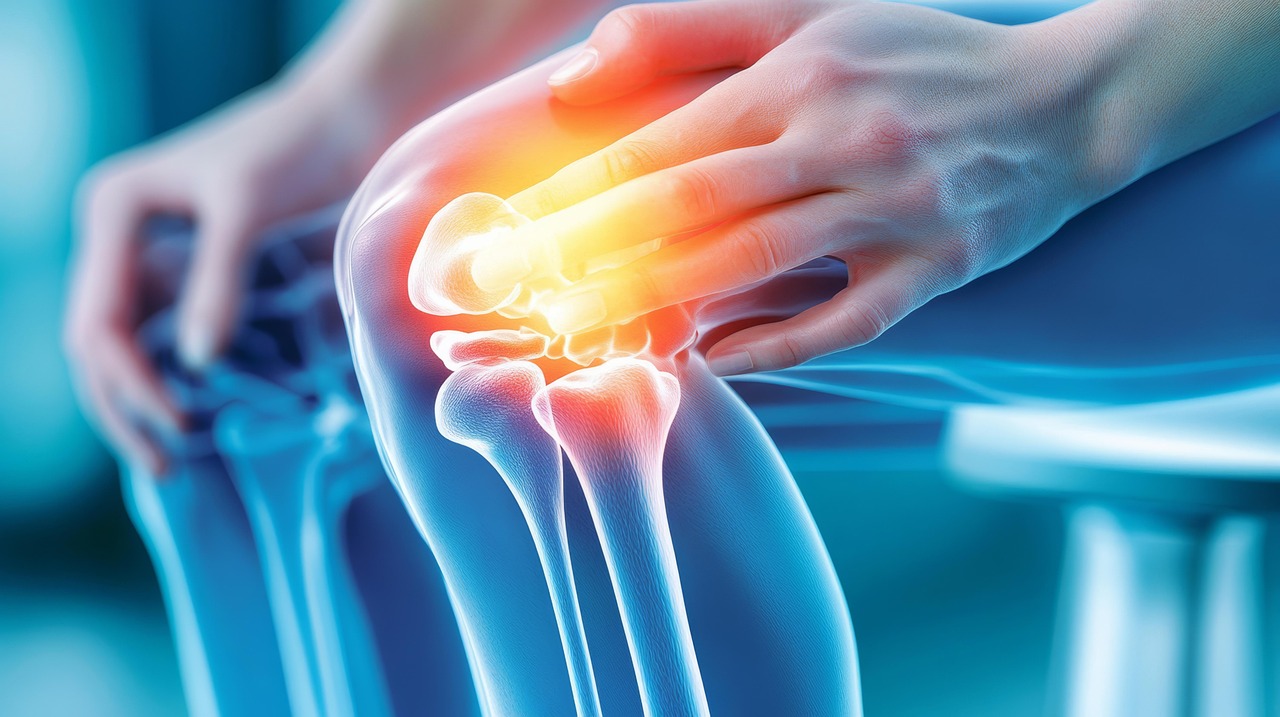Table of Contents
Natural Supplements for Menopause Joint Pain: Finding Relief the Easy Way
Menopause can bring various changes to your body, and joint pain is one of the common issues many women face during this time. Natural supplements offer promising options to help relieve menopause-related joint discomfort effectively. Exploring these natural supplements for menopause joint pain could lead you to find relief without the side effects of traditional medications.

In addition to supplements, your diet and lifestyle choices play an important role in managing joint health during menopause. Simple changes, like incorporating certain foods and engaging in light exercises, can make a big difference. It’s essential to understand your body’s needs and find the right mix of remedies that work for you.
Key Takeaways
- Natural supplements can help reduce joint pain during menopause.
- Diet and lifestyle changes support better joint health.
- Understanding your body’s needs is key to finding relief.
Understanding Menopause and Joint Pain
Menopause brings significant changes to your body, especially regarding hormonal balance. It’s common to experience joint pain during this time, largely due to fluctuations in hormone levels like estrogen. Here’s a closer look at how these changes are linked to joint health and what symptoms you might experience.
The Link Between Hormonal Changes and Joint Health
As you approach menopause, your body’s estrogen levels start to drop. Estrogen plays a key role in keeping joints healthy. It helps maintain cartilage and supports bone density.
When estrogen levels decrease, you may notice increased inflammation and stiffness in your joints. This can lead to conditions such as osteoarthritis. Research suggests that many women experience joint pain during this transitional phase due to inflammation caused by hormonal changes.
In addition to estrogen, other hormones like progesterone and testosterone also fluctuate, which can further impact joint health. These hormonal shifts can make existing joint issues worse or even lead to new ones.
Common Joint Pain Symptoms During Menopause
Joint pain can manifest in several ways during menopause. You might experience:
- Stiffness: Joints may feel tight, especially after inactivity.
- Swelling: Inflamed joints can show visible signs of swelling.
- Tenderness: Joints may be sore to the touch or with movement.
Many women report that their joint pain affects their daily activities, making simple movements uncomfortable.
Common areas for joint pain include knees, hips, and wrists. It’s important to pay attention to these symptoms and discuss any concerns with your healthcare provider. They can help you find ways to manage and mitigate these symptoms effectively.
Key Supplements for Menopause-Related Joint Pain
Managing joint pain during menopause can feel overwhelming, but certain natural supplements can really help. Here’s a look at some key options, including herbal remedies and essential vitamins, that you can consider incorporating into your routine.
Herbal Supplements: Turmeric, Ginger, and Nettle
Herbal supplements like turmeric, ginger, and nettle are your powerful allies against joint pain. Turmeric, known for its active compound curcumin, has strong anti-inflammatory properties. It can help reduce the swelling and discomfort in your joints.
Ginger also plays a significant role. It contains gingerol, which may help ease inflammation and pain. A warm ginger tea can be a comforting addition to your diet.
Nettle is lesser-known but effective as well. Nettle is rich in vitamins and may help with pain relief. You can find it in teas or supplements, making it easy to add to your daily routine.
Vitamins and Minerals: The Roles of Vitamin D, Calcium, and Magnesium
Vitamins and minerals are crucial for maintaining joint health. Vitamin D not only supports bone health but also plays a role in reducing inflammation. Low levels of vitamin D are common during menopause, so getting tested might be a good idea.
Calcium is essential for bone strength. Menopause can lead to lower levels of calcium in your bones, making it vital to include calcium-rich foods or supplements in your diet.
Magnesium is another important mineral. It helps with muscle function and may relieve tension in the surrounding muscles, reducing overall discomfort. Consider foods like leafy greens, nuts, and seeds or talk to your doctor about a magnesium supplement.
Omega-3 Fatty Acids and Their Anti-Inflammatory Properties
Omega-3 fatty acids are known for their anti-inflammatory effects, which can be beneficial for joint pain. Found in fatty fish like salmon, walnuts, and flaxseeds, these healthy fats can help reduce inflammation and improve joint function.
If you’re not getting enough omega-3s from your diet, supplements like fish oil or algae oil can be a great alternative. Aim for a balanced intake of these fatty acids to support not just your joints but your overall health during menopause.
Diet and Lifestyle Considerations for Joint Health
Making simple changes to your diet and lifestyle can significantly help your joints. Paying attention to what you eat, staying active, and managing stress are key factors that can improve joint health during menopause.
Incorporating Anti-Inflammatory Foods into Your Diet
Eating anti-inflammatory foods can help reduce joint pain and stiffness. Focus on foods rich in antioxidants, like leafy greens, berries, and nuts. These foods combat inflammation and support your overall health.
In addition, consider adding omega-3 fatty acids, found in fish like salmon and flaxseeds. They are known for their anti-inflammatory properties. Other helpful options include turmeric and ginger, which can be used in various dishes or taken as supplements.
Aim for a balanced diet that features a variety of colors on your plate. This not only keeps meals interesting but also ensures you’re getting a broad range of nutrients that support joint function and flexibility.
The Importance of Regular Exercise and Weight Management
Staying active plays a crucial role in maintaining joint health. Regular exercise strengthens the muscles around your joints, improving stability and reducing stiffness. Low-impact exercises like swimming, cycling, or walking can help you stay fit without putting too much stress on your joints.
Don’t forget strength training! Adding weights or resistance bands to your routine can enhance joint function. Aim for at least 150 minutes of moderate exercise each week.
Keeping a healthy weight also matters. Extra weight can increase stress on your joints, especially in the lower body. Losing even a small amount of weight can make a big difference in joint comfort.
Stress Management and Its Impact on Hormone Levels
Stress can negatively affect your hormone levels, which in turn can worsen joint pain. Finding ways to manage stress is essential. Techniques like yoga and tai chi combine gentle movements with relaxation. They can help lower inflammation and improve joint flexibility.
Incorporating deep breathing exercises or mindfulness practices into your daily routine can also be beneficial. You don’t need to schedule long sessions—short, frequent breaks to breathe and relax can help reduce overall stress levels.
Paying attention to your mental well-being is just as important as physical health. When you manage stress, you support your hormones, which can lead to greater joint health and comfort.
Additional Natural Remedies and Therapies
There are various natural remedies and therapies that can help manage joint pain during menopause. These options can support joint health and improve your overall well-being without relying solely on medications.
Exploring the Benefits of Collagen and MSM
Collagen is a protein that keeps your joints strong and flexible. As you age, collagen production decreases, which can lead to joint discomfort. Supplementing with collagen can improve cartilage health and support bone density, making it beneficial for menopausal women.
Methylsulfonylmethane (MSM) is another promising option. It has anti-inflammatory properties that might help reduce pain and improve joint function. Using both collagen and MSM together may maximize their effectiveness. Many people have reported less stiffness and increased mobility after adding these supplements to their routine.
Movement Therapies: Tai Chi, Pilates, and Yoga
Engaging in gentle movement therapies like Tai Chi, Pilates, and yoga can be great for relieving joint pain. These practices focus on flexibility, balance, and strength, which are crucial for maintaining healthy joints.
Tai Chi promotes slow, flowing movements that enhance balance and alleviate stress. Pilates focuses on core strength and stability, helping to support your joints better. Yoga combines physical postures with breathing techniques, which can improve circulation and reduce inflammation.
Incorporating these exercises along with natural supplements for menopause joint pain into your routine can help boost your joint health and overall fitness, making it easier to manage menopause symptoms.
Alternative Treatments: Acupuncture and Massage Therapy
If you’re looking for additional relief, consider acupuncture and massage therapy. Acupuncture involves placing fine needles in specific points on the body, which may help alleviate pain and improve energy flow. Many women find acupuncture helps reduce joint pain related to menopause.
Massage therapy is another effective option. It can relieve muscle tension around your joints, improve circulation, and promote relaxation. Regular massage may also assist in increasing joint flexibility and reducing stiffness.
Exploring these alternative treatments can provide you with a holistic approach to managing your joint discomfort during menopause.
Supportive Therapies: Hormones and Beyond
When dealing with joint pain during menopause, you have several supportive therapy options. These include hormone replacement therapy, non-steroidal anti-inflammatory drugs (NSAIDs), and various natural supplements. Each can play a role in easing discomfort and promoting overall well-being.
Hormone Replacement Therapy and Its Controversies
Hormone replacement therapy (HRT) is a popular option for many women experiencing menopause symptoms, including joint pain. HRT often involves estrogen, which can help alleviate discomfort caused by hormonal imbalances. Bioidentical hormone replacement therapy is another choice that uses hormones identical to those your body makes.
Despite its benefits, HRT comes with controversies. Some studies link long-term use to health risks, like blood clots and certain cancers. Because of this, it’s important to discuss options with your doctor. They can help you weigh the benefits against the potential risks based on your individual health history.
Non-Steroidal Anti-Inflammatory Drugs (NSAIDs) and Alternatives
NSAIDs are common over-the-counter options for managing joint pain. They work by reducing inflammation, which is often a culprit in discomfort. Ibuprofen and naproxen are popular examples that can provide quick relief.
If you prefer alternatives, consider natural remedies. Some people find relief from compounds like glycyrrhizin from licorice, known for its anti-inflammatory properties. Additionally, incorporating foods high in phytoestrogens, like soy, can help balance hormones. Always remember to talk to your healthcare provider before trying new medications or supplements.
The Role of Supplements Like SAM-e and Probiotics
Supplements can be a helpful addition to manage menopause-related joint pain. SAM-e is known for its potential to improve joint function and reduce inflammation. This compound may help repair damaged cartilage, making it a worthwhile option to explore.
Probiotics also play a role in overall health. They help maintain a balanced gut microbiome, which can influence inflammation in the body. A healthy gut can have a positive impact on your immune system and joint health. Including foods rich in probiotics, like yogurt and fermented products, can support this balance.
Frequently Asked Questions
You might have some questions about managing joint pain during menopause. Here are specific answers to common questions that can help you understand natural remedies and effective supplements.
What’s a good natural remedy to ease joint pain from menopause?
Turmeric is a popular choice. Its active ingredient, curcumin, has anti-inflammatory properties. You could also try omega-3 fatty acids found in fish oil, which may help reduce inflammation.
How can joint pain be alleviated during menopause without using medications?
Physical activity is key. Gentle exercises like yoga and stretching can improve flexibility and reduce discomfort. You might also consider hot or cold packs to soothe your joints as needed.
Are there specific supplements recommended for muscle pain related to menopause?
Yes, magnesium can help. It plays a vital role in muscle health and can relieve soreness. Vitamin D is important too since it impacts muscle function and strength.
Can glucosamine be helpful for managing menopause-associated joint pain?
Glucosamine might be beneficial. It can help maintain cartilage and may reduce joint pain. It’s worth discussing with your doctor if it’s right for you.
Is there a natural anti-inflammatory that works well for menopausal symptoms?
Ginger is another natural anti-inflammatory. You can add it to your meals or drink it as tea. It may help with pain and inflammation during menopause.
What are the top supplements to consider for weight issues during menopause?
For weight management, consider incorporating fiber supplements like psyllium. They help with digestion and can keep you feeling full longer. Green tea extract is another option, as it may boost metabolism.

